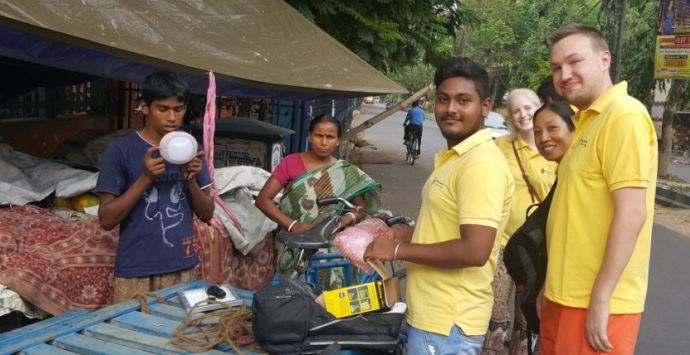Pollinate India: Checking in with the ‘Worker Bees’
Hi, I’m Melissa Ng, currently in India working with thriving social business Pollinate Energy. Along with my AECOM colleague Cat Ganley, I’m continuing to share my experiences right here on AECOM’s blog.
I had vague ideas of what an Indian slum would be like. On one hand, some of these notions turned out to be frighteningly real. I saw shanty buildings lining disused railway lines, boars foraging in the piles of debris alongside. I saw a community next to a suffocating, sulphurous grey drainage channel, with the walking paths mainly consisting of shards of plastic and rubbish.
However, there were aspects of the slums which didn’t meet my expectations. For one thing, the sizes of the communities varied. From the roadside consisting of approximately five households, to the riverside communities consisting of around 20 households, none of the communities I visited were overwhelmingly large. Instead, they retained their own unique character and community spirit.
Some communities revealed various industries that people within the slums work in; diesel stains and tyres, mountains of crushed sugar cane and bags of recycled plastic suggested an industry of mechanics, vendors and waste pickers. Other communities were more like villages, growing fruit and vegetables in small patches, their houses blending in with the surrounds, made of bamboo and clay. Another community situated peacefully next to a fish farm had more modern buildings with tiled roofs; each proudly displaying a satellite dish.

Our task was to review the Pollinate Energy worker incentive system by interviewing the people living in the communities — the ‘Worker Bees’ that assisted the Pollinators to make connections and therefore sales within their community. Or, as one Pollinator put it, the Worker Bee is the anchor which allows him to sink into the community. Often, the Worker Bee was the first customer to purchase a solar light in the community, or a prominent person within the community.
Speaking to the Worker Bees revealed their community-minded nature and resourcefulness. We found people welcoming and caring, and extremely generous. Sitting down at a Worker Bee’s roadside tea shop, she offered us chai and deep-fried food while we discussed how she helped the Pollinator make sales in the community, and what motivated her to do so.
In such communities, people rely heavily on each other and good relationships, and prefer receiving ‘gifts’ for their assistance. They also gave gifts freely. Even for just visiting the community, we received gifts — delicious mangoes.
While our time on the Fellowship program is almost done, the research we have been carrying out and the experiences I’ve had within these communities have changed my perspective on social impact and what a group of determined people can achieve.






